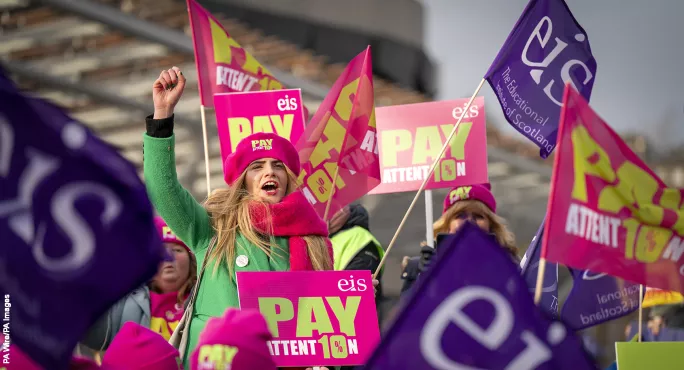Memories of 1980s pay strikes show why teachers must get a fair deal

When news broke this week of impending teacher strikes, memories were stirred of my earliest days in teaching when Scottish teachers went on strike in the mid-1980s. Then, as now, a right-wing Tory government was in power and, fuelled by deteriorating pay and conditions, teachers’ discontent had risen to the point where a large majority of union members voted to go on strike. I was one of them.
I’d started teaching in Edinburgh in 1982 - the year that the use of the belt to hit students with was outlawed in Edinburgh. I joined the EIS teaching union, which had strength in numbers and enjoyed a strong local and national profile.
The removal of the belt was a huge and contentious issue at the time and was resisted by many of my new colleagues. Promises from the government to invest in additional resources to support teachers develop new methodologies after the removal of the belt persuaded local authorities to phase out the belt.
When, almost inevitably, the promised resources, including additional teachers, did not materialise, the stage was set for a further deterioration in teacher morale amid deteriorating pay and conditions. Teachers voted overwhelmingly to go on strike, and so a series of school closures ensued across the country in 1984-85.
- Background: Teachers in Scotland begin first national pay strike since 1980s
- Related: It’s time ‘to make our voices heard’, say Scottish primary heads
- FAQs: What happens now that national teacher pay strike in Scotland is confirmed?
- Flashback to Tuesday: National teacher pay strike in Scotland will go ahead
I vividly remember standing on a picket line for the first and last time. Along with a few dozen colleagues, I stood outside the school gate to speak with staff as they arrived for work. Most of the conversations were amiable but that was certainly not the case for a handful of teachers (union members) who chose to cross the picket line.
Colleagues I was standing with were incandescent with rage that fellow union members were defying the union’s call to strike. Not only, it was argued, did this weaken the union’s bargaining power but it also meant that others who would stand to gain from a pay rise were not contributing to the collective protest. The language and sentiments aimed at strike-breaking colleagues were reminiscent of what happened among the miners. Friendships were shattered on that morning - some staff never spoke to each other again. I regretted being part of a group that chose to bully and intimidate valued friends and colleagues for having a different view and approach towards expressing their discontent.
Throughout the strikes, staff and students suffered. Staff who were on strike lost their pay, thus exacerbating their already difficult economic situation. As the strikes wore on, relations with many students’ families deteriorated. Then, as will happen now, it will be the students from the least well-off backgrounds who will be impacted most by days lost from school. If the planned strikes do not bear fruit and we enter a period of protracted strikes, the damage to our schools will last for years. Younger teachers will leave the profession and seek better-paid employment elsewhere. History tells us that those who leave the profession are highly unlikely to return. Additionally, it will become even more difficult to attract new teachers to the profession.
Should union tactics to force the government’s hand change from strike action to other forms of action, including “working to rule” and boycotting SQA-related duties, the damage will be severe and long lasting.
I know that teachers do not want to go on strike but, in the context of an intransigent paymaster and deteriorating pay and conditions, they have no choice. In common with other public sector workers, teachers work well beyond their contracted hours, and during the Covid pandemic, they have worked incredibly hard to ensure that the impact on our students was minimised. The last thing we want now is to have a disgruntled and demoralised teacher workforce entering a period of protracted industrial action at a time when we are still in the early stages of recovering from the devastating impact of the pandemic.
I remain (cautiously) optimistic that we can learn lessons from the past, and that strikes will be averted by offering all teachers the remuneration they so richly deserve, and need, to continue to be the best they can be for all students.
Donald J Macdonald is a recently retired secondary headteacher in Scotland
Register with Tes and you can read two free articles every month plus you'll have access to our range of award-winning newsletters.
Keep reading with our special offer!
You’ve reached your limit of free articles this month.
- Unlimited access to all Tes magazine content
- Save your favourite articles and gift them to your colleagues
- Exclusive subscriber-only stories
- Over 200,000 archived articles
- Unlimited access to all Tes magazine content
- Save your favourite articles and gift them to your colleagues
- Exclusive subscriber-only stories
- Over 200,000 archived articles
topics in this article



